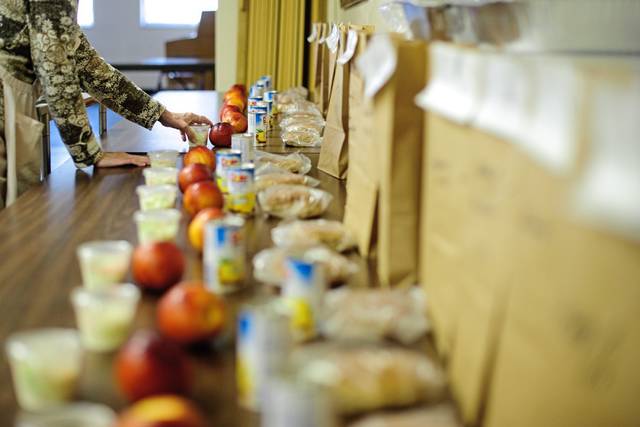No matter what meal Sue Floder makes for the Norwin Meals on Wheels program, she knows one thing to be true — the sweet treat goes first.
“I think most of them (seniors) go for the goody first because you lose a lot of your taste buds when you’re older, and sweet is the last taste bud that goes,” said Floder, a cook for the non-profit organization serving North Huntingdon, Irwin, North Irwin and parts of Hempfield and Penn Township.
Half of older adults are at risk for malnutrition, according to Defeat Malnutrition Today, a group of organizations and stakeholders working to end malnutrition in the elderly.
Locally, a 2017 Excela Health study said 20 out of 32 outpatients, or 69%, showed some form of malnutrition — a number officials are working to highlight as part of a malnutrition awareness week, running from Sept. 23-27.
Year round, registered dietitians at Excela sites complete a nutritional care plan for each patient to help improve their protein and calorie intakes, according to Robin Jennings, spokesperson for Excela. That means each patient that comes into an Excela facility is screened for weight loss and oral intake.
Based on test results that identify people as moderately or severely depleted, officials can recommend high calorie feeding, high protein milkshakes and parenteral nutrition, or getting nutrition through an IV or tube feeding, although nurses and doctors almost always try to feed a person by mouth, Excela dietitian Anita Gallagher said.
“You can see if someone passes away that they’ve been married to for 50, 60 years, it’s hard,” Gallagher said, adding that sometimes malnutrition is impacted by whether someone has another person to eat with.
“A lot of times they don’t eat as well as they should, if nobody’s around. The social contact is really important for older people,” Gallagher said. “If they can get out to a senior citizens center … the Meals on Wheels, if they come that’s another social contact.”
Gallagher added families are encouraged to visit seniors, making meals together or going grocery shopping, and to give them company.
At Meals on Wheels, Floder said, “I try to give them such a variety that they don’t get bored.”
She added when seniors are left on their own they lose nutritional values because, “They keep doing a soup and a soup and a soup.”
Other options to help keep seniors healthy, Jennings said, is home care, which can assess if people are able to take care of themselves.
“You can say you’re eating but you’re not,” Jennings said. “People then have a full sense of what they’re (the patient’s) doing.”
Westmoreland programs
Several organizations across the county work to help seniors with grocery shopping or simply having somebody to spend time with, including Open Your Heart to a Senior by United Way. The Westmoreland County Food Bank has a Commodity Supplemental Food Program, or CSFP, aimed at providing nutritional food to seniors.
According to Excela, almost 6% of seniors living in Westmoreland County over the age of 65 have limited access to a grocery store, while the food insecurity rate, or the economic and social indicator of the health of a community, hovered just over 10.5% for all people in the county.
At the Westmoreland County Food Bank, almost 1,370 seniors over the age of 60 receive CSFP boxes each month. Those are filled with cereal, juice, canned vegetables and fruit, canned meat, pasta, peanut butter and condensed milk, said Michelle Heller, director of programs.
And on top of seniors picking up boxes from food pantries across the county, deliveries are made to Parnassus Manor in New Kensington, Filbern Manor in West Newton, Irwin Manor, Trafford Manor, Hempfield Towers, Derry Station, Penn Towers in Penn Township, South Greengate Commons in Hempfield, Independent, Greenwood and Ridgeview apartments in Mt. Pleasant, McMurty Towers in Vandergrift, Jeannette Manor and Laurel Highlands Village in Latrobe.
“I just think the variety is the key,” Floder said of meals given to senior citizens.








